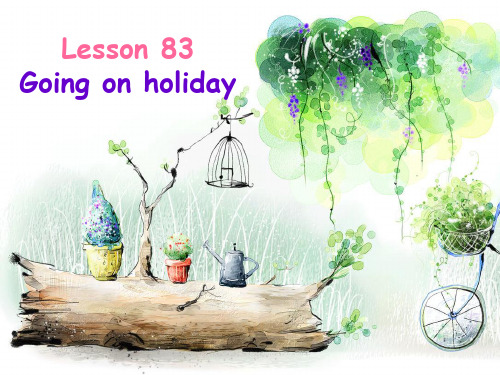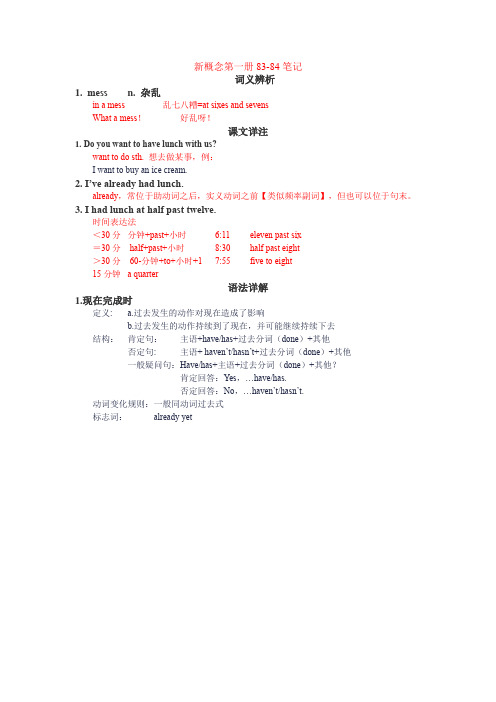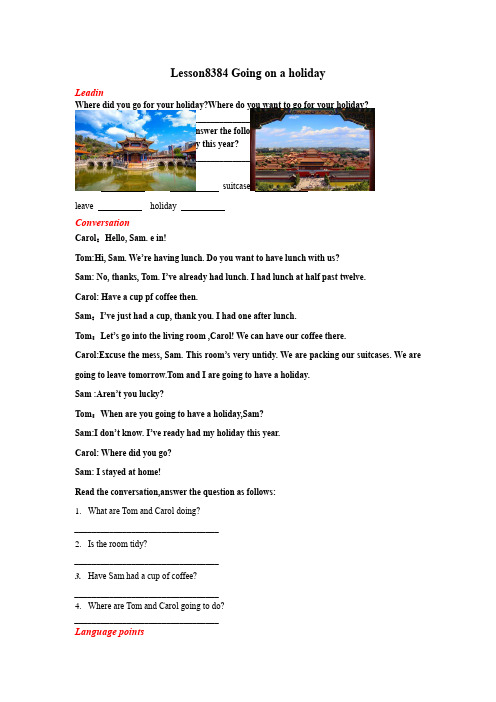新概念英语第一册:83-84课 语法及单词解析
新概念第一册Lesson83-84第十一次

★ 现在完成时 (1)主要用于以下两种情况:或者表示在过去
不确定的时间里发生的并与现在有着某种联系的 动作;或者表示开始于过去并持续到现在的动作。
I've already had my holiday this year. 本课中萨姆所面临的是第1种情况,正是因为他吃 了饭,喝过了咖啡,也休过假,因此他谢绝了汤 姆的邀请,并表示今年已无可能再次休假。
词汇扩展: messy adj. 凌乱的,脏的
Your desk is always messy.
★ pack [pæ k] v.打包,装箱
unpack
(1) v. 打包,装箱
Don' t forget to pack the mirror! 别忘了把镜子装起来! We began to pack them into a suitcase. 我们现在开始把它们装到手提箱里。
➢ Have you / Has she had any vegetables or fruit? ---- I haven’t / She hasn’t had any vegetables.
I’ve / She’s just (already) had some fruit.
HOME WORK:
tw of coffee then.
SAM:I've just had a cup, thank you. I had one after my lunch.
TOM: Let's go into the living room, Carol.
We can have our coffee there.
新概念英语第一册Lesson83-84

4.have a holiday 度假
have在不同的词组中,意思不同。 如have lunch,吃午饭。Have a cup of coffee,喝杯咖啡。
5.stay at home 呆在家里
注意名词home之前不加任何冠词。在诸如go home, arrive home的短语中,hom跟过去时比较接近,注意区分。 2)过去时强调过去做了什么,现在完成时强调过去的不确定的时间开始,这个动作 到现在的动作的延续,这个动作可能结束,也可能继续下去。
如我学习英语两年了。I have learned English for two years. 我已经读过这本书了。I have read this book.
本课中Sam的3句话属于第一种情况,正是因为他吃了饭,喝过了咖啡,也休 过假,因此他谢绝了Tom的邀请,并表示今年已无可能再次休假。
现在完成时是由have的现在式加上过去分词组成。 规则动词的过去分词与过去式相同,而不规则动词的过去分词则无统 一的规律可言。
现在完成时
过去
将来
一般过去时: 发生在以前,跟现在没有关系。过去我做了什么,我是什么状态等等。 昨天我去了伦敦。I went to London yesterday. 两分钟前我去了楼下。I went upstairs two minutes ago.
现在完成时:表示的是过去一个不确定的时间里发出的一个动作或状态 延续到现在,对现在的影响或是结果,这个动作可能完成也可能延续。
2.I’ve already had lunch.
already 已经 注意already的语序。在一般情况下,它跟在助动词后面。
3.Excuse the mess
乱七八糟,请原谅。 e.g. The room is in a mess. 房间很乱。
新概念英语一lesson83~84知识点

Lesson 83~Lesson84一.重点单词:1. leave 离开,过去式left 过去分词left在现在完成时句子中,不能与一段时间连用。
如果有一段时间,必须left把改成be away.He hasn’t left yet.He has already been away for two hours.2 already (已经,用在现在完成时态的肯定句子中)She has already had her holiday二,重点句型1.I have already had lunch . 我已经吃完午饭了2.I had lunch at half past twelve. 我在12:30吃的午饭。
3. Let’t go into the living room. 让我们进客厅吧4.Excuse the bless. 乱七八糟,请原谅5.I have already had my holiday this year. 今年我已度过假了。
三.语法精讲现在完成时态基本结构:主语+have/has+过去分词(done)①肯定句:主语+have/has+过去分词+其他②否定句:主语+have/has+not+过去分词+其他③一般疑问句:Have/Has+主语+过去分词+其他④特殊疑问句:特殊疑问词+一般疑问句(have/has+主语+过去分词+其他)一.现在完成时用来表示现在之前已发生过或完成的动作或状态,但其结果却和现在有联系,也就是说,动作或状态发生在过去但它的影响现在还存在.I have spent all of my money.(含义是:现在我没有钱花了.) Jane has cleaned the table.(含义是:现在桌子已经擦好了.) Mike has been ill.(含义是:现在仍然很虚弱)He has returned from abroad. (含义是:现在已在此地)二.现在完成时可以用来表示发生在过去某一时刻的,持续到现在的动作(用行为动词表示)或状态(be动词表示)常与for(+时间段),since(+时间点或过去时的句子)连用.Mary has been ill for three days.I have lived here since 1998.注意:1.现在完成时不能单独与准确时间连用,(如表示过去的时间状语)如yesterday(morning、afternoon),last(morning、afternoon)等,除非与for,since连用.2.现在完成时常常同表示不确定的过去时间状语或频度副词连用,如already(肯定), yet(否定,疑问), just, before, ,still, never,ever,等:He has already had lunch.I haven't seen him yet.We have (never)seen that film before.Have you ever been to Dalian?Have they found the missing child yet ?3.现在完成时常和短语"up to now /till now", "so far" (意思是从过去某一确定的时间一直延续到现在.)Up to/till now he's read many story books. 至今他已读过好多故事书。
新概念英语第1册第83-84课重点语法

第83-84课的内容: ⼀、重要句型或语法 1、现在完成时 表⽰过去发⽣的动作对现在造成的影响或结果,基本形式为have/has done。
本课侧重的是already和just的⽤法。
如:I have already had lunch. / I have just had a cup. 2、复习have的⽤法 本课复习have的⽤法。
如:表吃喝的have lunch,表万能do的have a holiday。
⼆、课⽂主要语⾔点 We're having lunch. 可在此快速复习have的⽤法。
Do you want to have lunch with us? 1)want to do sth.,想要做什么。
2)do sth. with sb.,和某⼈⼀起做某事。
I've already had lunch. 注意提醒学⽣完成时的标志性词语already。
I had lunch at half past twelve. 注意区分现在完成时和⼀般现在时。
前者强调的是过去发⽣的动作对现在造成的影响,⽽后者只是强调过去什么时间做过什么事情。
Have a cup of coffee then. 可复习祈使句的⽤法。
I've just had a cup, thank you. 提醒学⽣注意just与already⼀样,是完成时的标志性词语。
I had one after my lunch. 1)可让学⽣解释为什么此处的动词⽤⼀般过去时,⽽不是现在完成时。
2)one,⽤来指代前⽂提到的a cup of coffee。
Let's go into the living room, Carol. Let's do sth.,祈使句,⽤来提出建议等。
We can have our coffee there. 可提问学⽣there指代的内容,即前⽂的the living room。
新概念第一册第83-84课重点知识(精)

新概念第⼀册第83-84课重点知识(精)
Lesson83-84 going on holiday去度假Do you want to have lunch with us?你想和我们⼀起吃午餐吗?I have already had lunch.我已经吃过中餐了。
注意这是新的知识点---现在完成时:⽤法是have+动词的过去分词(不是过去式表⽰的意思是已经。
(并且对现状造成了影响 Already这个单词意思就是已经,是现在完成时的时间标志。
例如I have already had my holiday this year.今年我已经去度假过了。
I have just had a cup of coffee我刚刚已经喝了⼀杯咖啡。
注意这句话也是现在完成时,just表⽰刚刚,Let's go into the living room.让我们⼀起到客厅去吧。
This rom is very untidy. untidy表⽰不整洁的,We're packing our suitcases.我们正在收拾打包⾏李。
We're going to have a holiday.我们要去度假啦!最后记住三个单词lucky幸运的,unlucky不幸运的,mess杂乱、凌乱。
新概念83-84笔记

新概念第一册83-84笔记
词义辨析
1.mess n. 杂乱
in a mess乱七八糟=at sixes and sevens
What a mess!好乱呀!
课文详注
1. Do you want to have lunch with us?
want to do sth. 想去做某事,例:
I want to buy an ice cream.
2.I’ve already had lunch.
already,常位于助动词之后,实义动词之前【类似频率副词】,但也可以位于句末。
3.I had lunch at half past twelve.
时间表达法
<30分分钟+past+小时6:11eleven past six
=30分half+past+小时8:30 half past eight
>30分60-分钟+to+小时+1 7:55five to eight
15分钟 a quarter
语法详解
1.现在完成时
定义: a.过去发生的动作对现在造成了影响
b.过去发生的动作持续到了现在,并可能继续持续下去
结构:肯定句:主语+have/has+过去分词(done)+其他
否定句:主语+ haven’t/hasn’t+过去分词(done)+其他
一般疑问句:Have/has+主语+过去分词(done)+其他?
肯定回答:Yes,…have/has.
否定回答:No,…haven’t/hasn’t.
动词变化规则:一般同动词过去式
标志词:already yet。
Lesson83-84(讲义)新概念英语第一册

Lesson8384 Going on a holidayLeadinWhere did you go for your holiday?Where do you want to go for your holiday?____________________________________________________________________Now,let’s listen to the tape and answer the following questions:Where did Sam go for his holiday this year?____________________________________________________________________Words and phrasesmess pack suitcaseleave holidayConversationCarol:Hello, Sam. e in!Tom:Hi, Sam. We’re having lunch. Do you want to have lunch with us?Sam: No, thanks, Tom. I’ve already had lunch. I had lunch at half past twelve.Carol: Have a cup pf coffee then.Sam:I’ve just had a cup, thank you. I had one after lunch.Tom:Let’s go into the living room ,Carol! We can have our coffee there.Carol:Excuse the mess, Sam. This room’s very untidy. We are packing our suitcases. We are going to leave tomorrow.Tom and I are going to have a holiday.Sam :Aren’t you lucky?Tom:When are you going to have a holiday,Sam?Sam:I don’t know. I’ve ready had my holiday this year.Carol: Where did you go?Sam: I stayed at home!Read the conversation,answer the question as follows:1.What are Tom and Carol doing?_________________________________2.Is the room tidy?_________________________________3.Have Sam had a cup of coffee?_________________________________4.Where are Tom and Carol going to do?_________________________________Language pointse in作动词短语,含义为进来类似短语:e on 加油 e from 来自=be from翻译:加油!你可以做到的!________________________________________________Lily来自北京。
新概念英语第一册lesson83-84课件

I had lunch an hour ago. She went to London last year.
一般现在时& 一般过去时 & 现在完成时 & 现在进行时
1. 一般过去时:表示在过去的同某个时间做过的事情或 存在的状态。I did my homework last night.
2. 现在完成时:动作发生在过去,但对现在造成了影响
leave come go arrive 可以代替一般将来时 We’re tomorrow Tom and Ileaving are going to have a
I’m coming soon. holiday. She’s going My father is arriving
We’re going to leave tomorrow. = We’re leaving tomorrow. 当动词是leave, go, come, arrive等时,可 以用现在进行时表将来。 I’m coming. 他今天晚上就到 He’s arriving tonight.
现在完成时vs一般过去时时态用法动词形式时间状语标志词例句现在完已经发生的事对现在的影响havehas动词的过去分词alreadyjust用于肯定ivealreadyhadlunchhaveyouhadsometea
洗澡 在楼上 快准备好了 请抽烟 来杯威士忌 在7点钟 吃晚餐 去饭店
烤牛肉和土豆
Lesson 81 短语 1.Have a bath
否定式: 主语 + 助动词have/has + not + 动词的过去分词.
英语小贴士
already & yet
1. already “已经”,用于肯定、 2. yet 用于疑问、否定句的句尾,含有“仍然”, “还没有”之意。 Have you done it yet? ---- Yes, I have already done it.
- 1、下载文档前请自行甄别文档内容的完整性,平台不提供额外的编辑、内容补充、找答案等附加服务。
- 2、"仅部分预览"的文档,不可在线预览部分如存在完整性等问题,可反馈申请退款(可完整预览的文档不适用该条件!)。
- 3、如文档侵犯您的权益,请联系客服反馈,我们会尽快为您处理(人工客服工作时间:9:00-18:30)。
新概念英语第一册:83-84课语法及单词解析
【篇一】
语法 Grammar in use
现在完成时
(1)在英语中,现在完成时主要用于以下两种情况:或者表示在过去不确定的时间里发生的并与现在有着某种联系的动作;或者表示开始于过去并持续到现在的动作。
本课中萨姆所面临的是第1种情况,正是因为他吃了饭,喝过了咖啡,也休过假,所以他谢绝了汤姆的邀请,并表示今年已无可能再次休假。
(2)现在完成时在汉语中常用"了"、"过"或"已经"来表示。
(3)现在完成时由 have/has+ 过去分词构成,单数第 3人称用
has,其他人称皆用have。
规则动词的过去分词与过去式相同,而不规则动词的过去分词则无统一的规律可言,需特别加以记忆。
(4)一般现在完成时通常与表示不确定的时间副词或短语连用如 just, already, before, never, ever, twice, three times等。
【篇二】
词汇学习 Word study
leave v.
(1)离开,出发:
The train is going to leave in 5 minutes.
火车将于5分钟后开出。
Im going to leave Italy.
我准备离开意大利。
(2)舍弃;脱离:
Johns wife left him for another man.
约翰的妻子舍他而去,投入另一个男子的怀抱。
Alexander is leaving the company after 30 years service
亚历山大将在为公司服务了30年之后离开公司。
(3)留给,遗留;委托:
The famous actress left all her money to charity.
这位的女演员将她所有的钱都遗留给了慈善机构。
Leave it to me, he said.
"这事交给我来办吧,"他说道。
【篇三】
pack v.
(1)打包,装箱:
We are leaving tomorrow and I havent even started packing yet.我们明天就要走了,而我甚至还没开始将行李打包呢。
Don t forget to pack the mirror!
别忘了把镜子装起来!
(2)挤满,塞满:
The movie fans packed the hall.
大厅里挤满了影迷。
The bus was packed with people.公共汽车里挤满了人。
